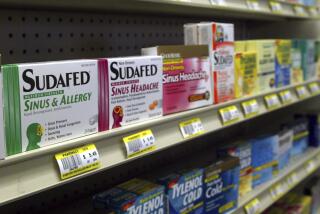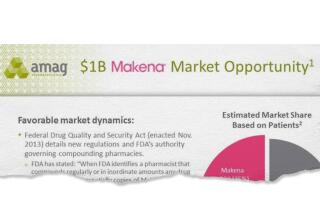Seldane Pulled for a Safer Allergy Drug
- Share via
WASHINGTON — The manufacturer of Seldane, one of the most popular allergy drugs ever sold, said Monday that it will voluntarily remove the product from the marketplace Feb. 1 in response to the Food and Drug Administration’s approval of the company’s safer alternative drug.
The decision will eliminate a drug with the potential to cause life-threatening heart problems when taken with certain other drugs.
The FDA began taking steps to ban Seldane last January, but it drew fierce resistance from the manufacturer, Hoechst Marion Roussel, based in Kansas City, Mo.
The agency had argued that Seldane was no longer needed because of the availability of the company’s alternative drug, Allegra, a compound chemically similar to Seldane but considered safer.
On Monday, the FDA announced it had approved another formulation of Allegra--Allegra-D, which adds a decongestant to the non-sedating antihistamine--enabling the company to market two versions of Allegra, as it had with Seldane.
As a result, Hoechst said it would “move its total respiratory marketing focus to the Allegra family” and withdraw Seldane.
The company “has worked closely with the medical community to switch allergy patients from Seldane to Allegra,” said Kirk Schueler, Hoechst’s vice president and U.S. commercial director.
“We believe the Allegra family of products is a better therapeutic option, suitable for a broader range of seasonal allergic rhinitis sufferers,” he said. “Now with Allegra-D, we can offer allergy patients a full range of treatment options.”
About 50 million Americans suffer from allergies, often precipitated by exposure to grass and tree pollen, mold and ragweed pollen. Symptoms typically affect the nose, but other complaints can include itchy, watery eyes and sinus congestion and pressure.
In 1996, there were 4.3 million prescriptions written for Seldane and 2.3 million for Seldane-D. Since the FDA began trying to remove the product, Seldane prescriptions had dropped to 1 million, while sales of Allegra climbed to 4.5 million.
Seldane was never regarded as an “imminent hazard,” which is why the FDA did not attempt to ban it immediately; in situations it considers extremely dangerous, the agency has the power to order an immediate recall of a drug or food.
Agency officials did not put Seldane in this category. But after its approval of Allegra in July 1996, the FDA concluded that Seldane’s potential risks outweighed its benefits.
Seldane, one of the most widely used drugs in the world, was introduced in 1985 and hailed as the first treatment for allergies that did not cause drowsiness. In 1995, U.S. wholesale sales of Seldane totaled $400 million.
At the time the FDA initiated its action, Seldane was the third best-selling allergy medication--after Claritin and Zyrtec--and was sold in 270 other countries. It remains on the market abroad, although European regulatory officials are conducting a scientific review of the product, according to Hoechst.
Allegra is sold thus far only in the United States and Canada, but its approval is pending in several other countries, the company said.
Several years ago, the FDA first began receiving reports of serious and sometimes deadly cardiac arrhythmias in Seldane patients who had liver disease or who were taking other drugs, including erythromycin, an antibiotic, and ketoconazole, an antifungal.
Other antihistamines that do not cause drowsiness have become available in recent years, but they are chemically different from Seldane. The FDA was reluctant to remove Seldane since not all patients respond the same way to the same drugs.
Instead, warnings were added to the labeling, and the company launched a massive education program, including letters to doctors, to prevent the drug interactions that might cause the cardiac reaction. But the agency continued to worry that co-prescribing would still occur.
The drug interaction apparently caused a buildup of terfenadine--the main chemical ingredient of Seldane--in the blood, resulting in the heart irregularities.
Allegra, on the other hand, contains fexofonadine, which is produced in the body when terfenadine is taken. However, it does not appear to cause the same cardiac problems when taken with other commonly prescribed medications.
Allegra-D is not recommended for patients with certain conditions, among them hypertension, diabetes, ischemic heart disease, increased intraocular pressure, hyperthyroidism and kidney or prostate problems.






